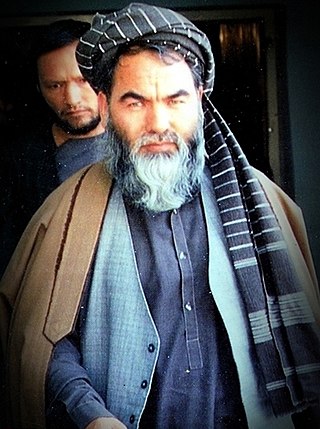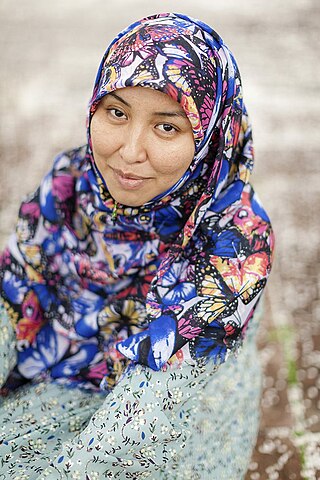
Mazar-i-Sharīf, also known as Mazar-e Sharīf or simply Mazar, is the fourth-largest city in Afghanistan by population, with an estimated 500,207 residents in 2021. It is the capital of Balkh province and is linked by highways with Kunduz in the east, Kabul in the southeast, Herat in the southwest and Termez, Uzbekistan in the north. It is about 55 km (34 mi) from the Uzbek border. The city is also a tourist attraction because of its famous shrines as well as the Islamic and Hellenistic archeological sites. The ancient city of Balkh is also nearby.
The following lists events that happened during 1996 in Afghanistan.

Abdul Ali Mazari was an Afghan Hazara politician and leader of the Hezbe Wahdat during and following the Soviet–Afghan War, who advocated for a federal system of governance in Afghanistan. He believed that this would end political and ethnic division in Afghanistan by guaranteeing rights to every ethnic group. He was allegedly captured and murdered by the Taliban during negotiations in 1995. In 2016, he was posthumously given the title "Martyr for National Unity of Afghanistan" and had a statue erected in his honor by the Islamic Republic of Afghanistan. Shortly after reclaiming power, the Taliban demolished the statue.
Sheberghān or Shaburghān, also spelled Shebirghan and Shibarghan, is the capital city of the Jowzjan Province in northern Afghanistan.
Mahmoud Saremi was an Iranian reporter, working for IRNA, as the news agency's head of office in Mazari Sharif. He was killed by the Taliban when they occupied the Iranian consulate in Mazari Sharif, together with eight Iranian diplomats.
Sholgara is a district in the southern part of Balkh Province, Afghanistan. Sholgara, just south of Mazari Sharif (Mazar), is strategically located at the crossroads between several districts: Sangcharak, Kishindih, Dar-I-Suf. Dar-I-Suf and Sangcharak are known for their resistance to the Taliban insurgency. It is commonly said that "who holds Sholgara, holds Mazar".

Zia Ul Shah is a citizen of Pakistan best known for the time he spent in extrajudicial detention in the United States Guantanamo Bay detention camps, in Cuba. His Guantanamo Internment Serial Number was 15.

The fall of Mazar-i-Sharif in November 2001 resulted from the first major offensive of the Afghanistan War after American intervention. A push into the city of Mazar-i-Sharif in Balkh Province by the United Islamic Front for the Salvation of Afghanistan, combined with U.S. Army Special Forces aerial bombardment, resulted in the withdrawal of Taliban forces who had held the city since 1998. After the fall of outlying villages, and an intensive bombardment, the Taliban and al-Qaeda forces withdrew from the city. Several hundred pro-Taliban fighters were killed. Approximately 500 were captured, and approximately 1,000 reportedly defected. The capture of Mazar-i-Sharif was the first major defeat for the Taliban.
The following lists events that happened during 1995 in Afghanistan.
The following lists events that happened during 1997 in Afghanistan.
Bamyan Airport, officially named Shahid Mazari Airport, is located in the city of Bamyan, which is the capital of Bamyan Province in Afghanistan. It is a domestic airport under the country's Ministry of Transport and Civil Aviation (MoTCA), and serves the population of Bamyan Province. Security in and around the airport is provided by the Afghan National Security Forces.
On 8 August 1998, amidst the Battles of Mazar-i-Sharif, the Iranian consulate in Mazar-i-Sharif was attacked as the Taliban were besieging the city. Initially, only the deaths of eight Iranian diplomats was reported, but two other diplomats and a journalist were later confirmed dead as well, bringing the total casualty rate to 11 personnel. The executions of the diplomats are speculated to have been carried out by Sipah-e-Sahaba Pakistan. During this time, Iran was supporting the anti-Taliban Northern Alliance, and the killings heightened direct military tensions along the Afghanistan–Iran border, which was controlled on the Afghan side by the Taliban's Islamic Emirate at the time.

Relations between Afghanistan and Tajikistan began in 1992. Afghanistan maintains an embassy in Dushanbe and a consulate in Khorugh. The current Afghanistan ambassador to Tajikistan is LTG. Mohammad Zahir Aghbar. Tajikistan maintains an embassy in Kabul and a consulate in Mazari Sharif, Faizabad and Kunduz. The current Tajikistan ambassador to Afghanistan is Sharofiddin Imom.

Hezb-e Wahdat-e Islami Afghanistan, shortened to Hezbe Wahdat, is an Afghan political party founded in 1989. Like most contemporary major political parties in Afghanistan, Hezb-e Wahdat is rooted in the turbulent period of the anti-Soviet resistance movements in Afghanistan in the 1980s. It was formed to bring together nine separate and mostly inimical military and ideological groups into a single entity.
Abdullah Mazari, commonly referred to as Abdullah, is an Afghan cricket player. A left-handed batsman and left-arm orthodox spin bowler, he has played for the Afghanistan national cricket team since 2001 and also for Peshawar, Peshawar Panthers and Afghan Cheetahs.

Mullah Noorullah Noori is the Minister of Borders and Tribal Affairs of the Islamic Emirate of Afghanistan since 7 September 2021. He was also the Taliban's Governor of Balkh Province during their first administration (1996–2001). Noorullah Noori spent more than 12 years in extrajudicial detention in the United States's Guantanamo Bay detention camps, in Cuba. Noori was released from the detention camp on May 31, 2014, in a prisoner exchange that involved Bowe Bergdahl and the Taliban Five, and flown to Qatar.
Hazara nationalism is a movement that claims the Hazara people, an ethnic group native to the Hazaristan region of Afghanistan, are a distinct nation and deserve a nation-state of their own. The movement propagates the view that Muslims are not a nation and that ethnic loyalty must surpass religious loyalty, though this view has been challenged by both the 1890s independence uprisings of Hazaristan and the systematic discrimination many Hazaras have historically faced within Afghanistan.

Commander Shafi Hazara was an ethnic Hazara military commander in Afghanistan. He was a senior commander during the resistance of west Kabul and Hazarajat between 1991 and 1996. In the 1990s, he led Hezb-e-Wahdat’s “Brigade 2” military wing against rival militias and, against the Taliban takeover.

Salima Mazari is an Afghan politician, who served as the District Governor of Charkint District in Balkh province in Afghanistan and one of the three women district governors in Afghanistan.








